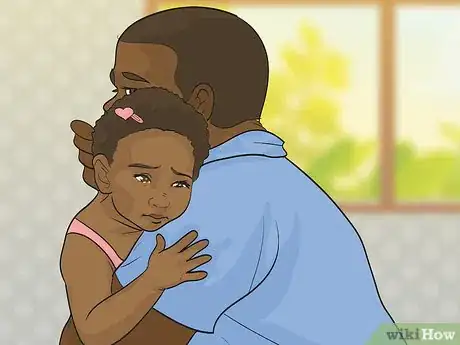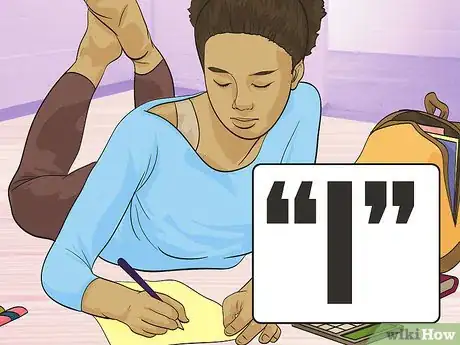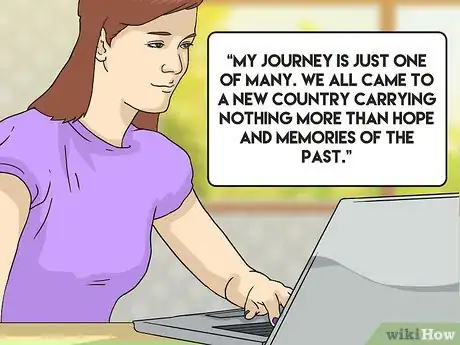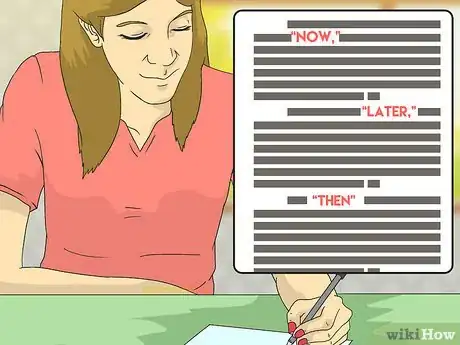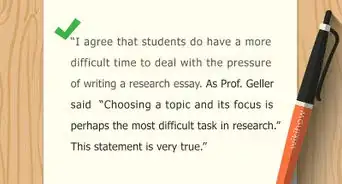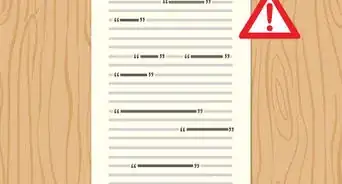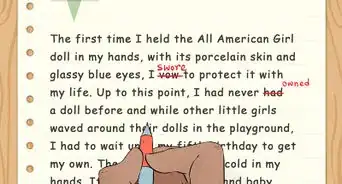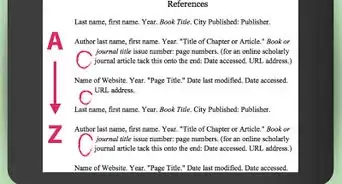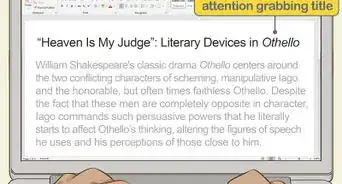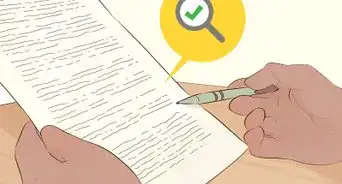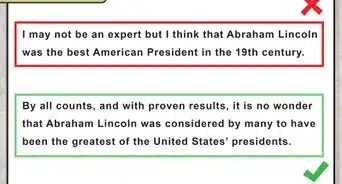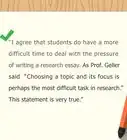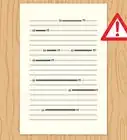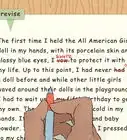This article was co-authored by Grant Faulkner, MA. Grant Faulkner is the Executive Director of National Novel Writing Month (NaNoWriMo) and the co-founder of 100 Word Story, a literary magazine. Grant has published two books on writing and has been published in The New York Times and Writer’s Digest. He co-hosts Write-minded, a weekly podcast on writing and publishing, and has a M.A. in Creative Writing from San Francisco State University.
This article has been viewed 96,704 times.
A personal narrative also called a personal essay, should engagingly tell a personal story. You may be writing a personal narrative for a college application, for a class, or your enjoyment. A good personal narrative will entertain the reader and offer insight into an idea or theme. To get started on a personal narrative, choose a story idea, and structure the essay so you know where you’re headed. Then, craft a strong opening for the narrative to draw your reader in.
Steps
Choosing a Story Idea for the Narrative
-
1Think of a meaningful event in your life. A personal narrative should focus on something pivotal or meaningful in your life and also connects to the prompt you are addressing, if applicable. Ask yourself, “What events in my life stand out the most for me? What events taught me something or made me realize something life-changing?”[1]
- Choose an event that feels full of meaning and significance to you personally. These events usually make the best story ideas for a personal narrative.
- For example, if your narrative focuses on your intended career path as a teacher, you could write a narrative about how a youth coaching experience showed you the importance of making a positive impact on children.
- Alternatively, if you’re writing about how you came to choose a college major in medical science, your narrative could focus on a wonderful volunteer experience you had as a child that made you want to help other people.
-
2Pick a personal story with a moral or lesson. A good personal essay will have an underlying moral or lesson, where the speaker undergoes a realization or change. Think of an experience where you learned a valuable lesson that you carried with you moving forward. Or an experience where you made a moral decision that shifted you in some way.[2]
- For instance, you may pick an experience where you lost an important match, only to learn the value of failing and do better. Or you may choose an experience where you made a moral decision to help someone, which then leads to positive outcomes for you and the person.
Advertisement -
3Focus on an idea that fits a theme. You can also go for a story idea that centers on a theme. You can then use your personal story to explore the theme in detail and from your perspective. Try to choose a theme that feels particular to you and your point of view.[3]
- For example, you may choose a theme like love and use it to explore your experience of love growing up in a family with two fathers. Or you may choose a theme like freedom and use to explore your struggles with freedom as a refugee.
- Alternatively, you can start writing out the narrative and discover the theme as you go along. Try to notice any ideas you keep coming back to as you write and see if these relate to an overarching theme.[4]
Structuring the Narrative
-
1Use the first-person voice. Most personal narratives use a first-person narrator, the “I.” Using the first person will make it easier for you to write the essay from your perspective and your personal experiences. Tell the personal narrative in your voice using “I” so the reader gets a sense of your point of view.[5]
- You may need to use a mixture of tenses throughout the narrative. For instance, the answer to the prompt or the narrative you discuss may be written in the present tense, while an anecdote or narration of a story may be written in the past tense, as it has already happened.
-
2Have a thesis statement. Even though your essay is personal, it should still have a thesis statement. Your thesis statement should appear after the hook in the final sentence of the introduction (though there may be sentences between the hook and the thesis).
- The thesis statement in a narrative essay can explore the events of the story in a brief way. Or it can tell the reader about the moral or lesson learned through the personal experience. You can also present the main theme in the essay in the thesis statement.
- For example, if you are writing an essay about your personal experience as a refugee, you may have a thesis statement that presents the theme of freedom. You may write, “My journey is just one of many. We all came to a new country carrying nothing more than hope and memories of the past.”
-
3Include supporting body paragraphs. Your essay should include a body section where you present supporting evidence for your thesis statement. The supporting evidence can be in the form of commentary that addresses the prompt as well as in the events of the story you are telling. Do this chronologically so it is easy for the reader to follow. Or use terms to frame time, such as “now,” “later,” or “then” if you decide to jump around in a time when telling the story.
- For example, you may have three supporting body paragraphs where you tell your narrative based on the theme of your essay. You may start with your experience of “freedom” in your home country in the first paragraph, followed by your experience of the same theme in your new country in the second paragraph.
-
4End with the moral of the narrative. Most personal narratives end with a moral or lesson stated in the concluding paragraph. This paragraph should include a reflection on how the personal experience shifted or changed you in the present. If you're having trouble determining a moral to your story, consider why the personal event is significant and meaningful to you.[6]
- For example, you may end the essay by stating the lesson or moral you learned from the personal experience. Or you may note how the experience has positively affected your life now.
Creating a Strong Opening for the Narrative
-
1Start with a hook. To help you get started on your narrative, structure out your essay so you have a plan when you begin writing. Always begin your essay with a hook or an opening that draws the reader in. The hook should be short, clear, and easy to read. It should give the reader a sense of what to expect from your essay.
- The hook is usually not longer than 1 to 2 sentences. It starts your introductory paragraph and can take the form of a scene, question, interesting fact or statement, or even an anecdote.
-
2Set the scene to offer specific details and strong imagery. One way you can open the personal narrative is to start right in the scene, with the “I” in action. Describe the setting and have the “I” do things in the setting to create an engaging opening scene.[7]
- For example, you may wish, “I huddled under my Disney Princess bed cover as my father banged on my bedroom door. As I listened to his muffled screams, I wondered if it was possible to simply disappear, away from my lonely home life and my failing high school grades.”
-
3Pose a question if you want to get the reader thinking. Choose a question that focuses on the theme of your narrative. Address the reader directly in the question. Keep the question short and clear so the reader can follow along.[8]
- For example, you may start with a question like, “Have you ever wondered how it might feel to leave your home forever?” or “Have you ever felt like a stranger in your own country?”
-
4Use an interesting fact to connect to your personal experiences. You can use an interesting fact or a funny statement that relates to the theme of your essay. Starting with an interesting fact or statement can draw your reader in and get them thinking right away.[9]
- For example, you may start with an interesting fact about lawnmowers if your narrative is about how mowing lawns as a kid taught you the value of hard work. Or you may choose a funny statement about winning and losing if your essay is about learning how to accept failure.
-
5Start with an anecdote to connect to the larger theme or story. An anecdote is often 1 to 3 sentences long and explores a lesson or moral. It should raise questions in your reader’s mind and introduce key ideas in the essay.[10]
- For example, if you are writing about learning how to accept failure, you may start with an anecdote about your father telling you not to lose a softball game as a kid.
- Or if you are writing about your personal experiences as a refugee, you may use an anecdote on a moment of acceptance you experienced in your new country.
Expert Q&A
-
QuestionHow can I determine a theme for my personal narrative if I am having trouble thinking of one?
 Grant Faulkner, MAGrant Faulkner is the Executive Director of National Novel Writing Month (NaNoWriMo) and the co-founder of 100 Word Story, a literary magazine. Grant has published two books on writing and has been published in The New York Times and Writer’s Digest. He co-hosts Write-minded, a weekly podcast on writing and publishing, and has a M.A. in Creative Writing from San Francisco State University.
Grant Faulkner, MAGrant Faulkner is the Executive Director of National Novel Writing Month (NaNoWriMo) and the co-founder of 100 Word Story, a literary magazine. Grant has published two books on writing and has been published in The New York Times and Writer’s Digest. He co-hosts Write-minded, a weekly podcast on writing and publishing, and has a M.A. in Creative Writing from San Francisco State University.
Professional Writer Sometimes themes are planned, and sometimes they're not planned. Sometimes they emerge from the story. If you're having trouble, I would write the story and explore possible themes as you write it.
Sometimes themes are planned, and sometimes they're not planned. Sometimes they emerge from the story. If you're having trouble, I would write the story and explore possible themes as you write it. -
QuestionCan we start a narrative essay with a question?
 Haley DiFCommunity AnswerA question is a popular method to hook your audience at the beginning of an essay/narrative. Especially, using thought-provoking questions that readers don't usually consider will draw them in.
Haley DiFCommunity AnswerA question is a popular method to hook your audience at the beginning of an essay/narrative. Especially, using thought-provoking questions that readers don't usually consider will draw them in.
References
- ↑ http://grammar.yourdictionary.com/grammar-rules-and-tips/tips-for-writing-a-personal-narrative-essay.html
- ↑ http://grammar.yourdictionary.com/grammar-rules-and-tips/tips-for-writing-a-personal-narrative-essay.html
- ↑ https://www.kibin.com/essay-writing-blog/how-to-start-a-narrative-essay/
- ↑ Grant Faulkner, MA. Professional Writer. Expert Interview. 8 January 2019.
- ↑ http://www.artsyqr.com/crafting-a-personal-narrative-essay-starting-out/
- ↑ Grant Faulkner, MA. Professional Writer. Expert Interview. 8 January 2019.
- ↑ https://www.kibin.com/essay-writing-blog/how-to-start-a-narrative-essay/
- ↑ https://www.kibin.com/essay-writing-blog/how-to-start-a-narrative-essay/
- ↑ https://www.kibin.com/essay-writing-blog/how-to-start-a-narrative-essay/
- ↑ http://www.artsyqr.com/crafting-a-personal-narrative-essay-starting-out/
- ↑ Grant Faulkner, MA. Professional Writer. Expert Interview. 8 January 2019.


